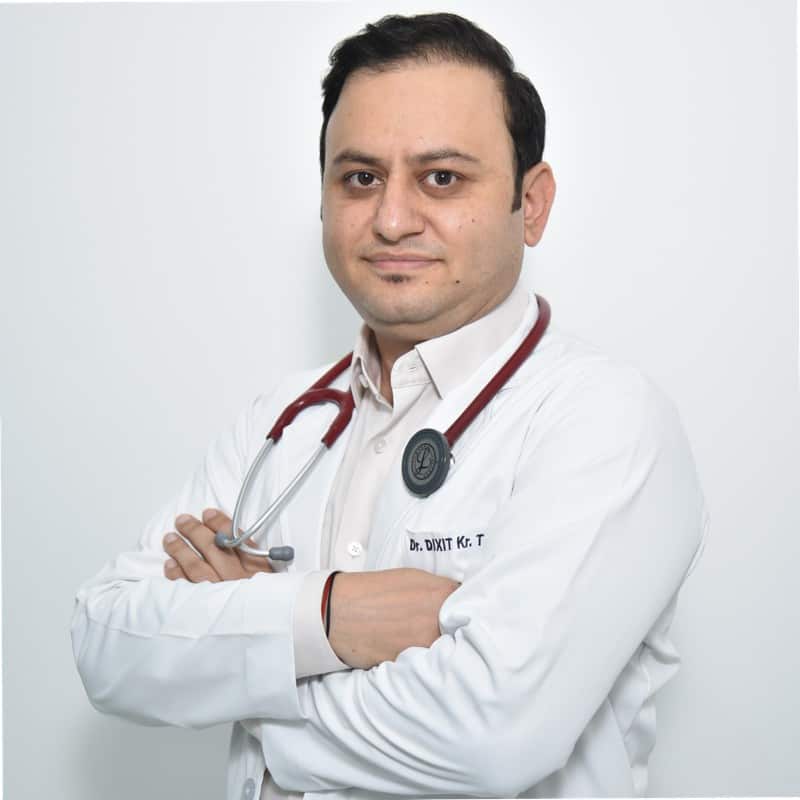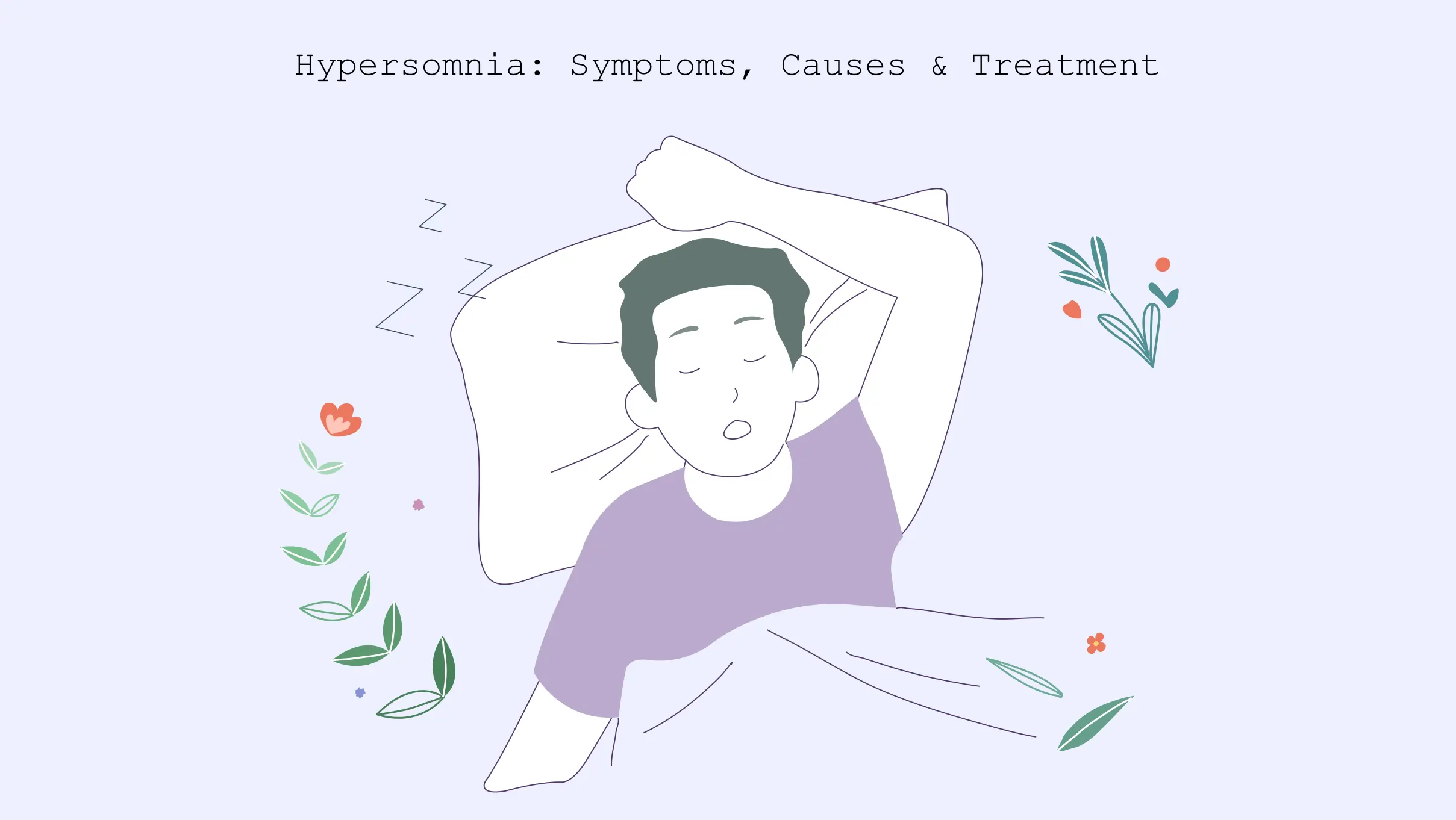Hypersomnia: Symptoms, Causes & Treatment
Written by

Medical reviewed by


Hypersomnia, also known as hypersomnolence, is a sleep disorder characterised by excessive sleepiness or drowsiness during times when an individual is expected to be awake and alert. It refers to a condition where a person experiences an overwhelming urge to sleep and may have difficulty staying awake even during daytime hours.
While hypersomnia and insomnia are different, they may have specific overlapping symptoms. People commonly confuse these conditions because both are associated with difficulty in falling or staying asleep.
What Is Hypersomnia?
Hypersomnia is a type of sleep disorder that causes you to have excessive daytime sleepiness. It also can cause you to have difficulty concentrating, making it challenging to complete specific tasks. Hypersomnia may be caused by depression, anxiety, or another mental health condition. If you’re suffering from hypersomnia, you must speak with your doctor and seek help. This will help you get the treatment that you need and deserve.
What Causes Hypersomnia?
Hypersomnia, the primary one, is believed to be caused due to disturbances in the circadian rhythm. It can also result from insufficient sleep, sleep apnea, fatigue, frequent consumption of alcohol, drugs, head injury, or side effects of medication, such as antidepressants and medicines for blood pressure.
Types of Hypersomnia
Secondary Hypersomnia
Secondary hypersomnia is a condition when excessive sleepiness is a result of some other underlying condition. For e.g. a person with narcolepsy or another sleep disorder has chronic daytime sleepiness (CDS) and fatigue that does not improve with treatment. It may also be called non-narcoleptic hypersomnia (NOH).
People with secondary hypersomnia are generally healthy but may have sleep apnea or other medical problems. They often work sedentary jobs and have difficulty staying awake during the day. Sometimes they feel tired all the time, even at night. The symptoms of secondary hypersomnia can be similar to those of primary hypersomnia, discussed below.
Primary Hypersomnia
Primary hypersomnia is characterised by excessive daytime sleepiness, resulting in an inability to function during the day. Primary hypersomnia is often caused by a medical condition (such as narcolepsy) but can also be caused by psychiatric disorders such as depression and attention deficit hyperactivity disorder (ADHD).
What Is Idiopathic Hypersomnia?
Idiopathic hypersomnia is a sleep disorder characterised by excessive daytime sleepiness and impaired responsiveness to wakefulness during the day. It can occur in people of any age.
People with idiopathic hypersomnia typically fall asleep quickly. They may be able to nap for hours and even sleep through the night.
The problem begins when the person cannot stay awake, even when they try hard. A person’s activity level decreases during this stage, as well.
What Causes Idiopathic Hypersomnia?
There are many symptoms of hypersomnia that vary from person to person. Hypersomnia symptoms can vary, but one common indication is excessive sleepiness during sedentary activities, which is often observed by patients.
Some people with hypersomnia may also have other health conditions, including:
- Sleep Apnea
- Narcolepsy (A Sleep Disorder in Which an Individual Experiences Frequent Episodes of Sleep)
- Chronic Pain
- Depression
- Anxiety Disorder or Panic Attack
- Addiction to Certain Drugs or Alcohol
What Are the Symptoms of Hypersomnia?
There are many symptoms of hypersomnia that vary from person to person. The most common symptom is not being able to sleep for more than four hours at a time.
Other hypersomnia symptoms might include:
- Difficulty getting out of bed in the morning.
- Lack of energy and fatigue during the day.
- Napping during the day.
- Memory or concentration difficulties.
How Is Hypersomnia Diagnosed?
Here are popular means to diagnose hypersomnia:
Polysomnography
The diagnosis of hypersomnia is often made based on a sleep history and an overnight polysomnogram (PSG). A PSG is an examination that records brain waves, body movements during sleep, breathing, and heart rate. This can be done in a lab or at home.
The results of a PSG come with many possible interpretations, so it’s essential to have a sleep specialist interpret the results for you.
Multiple Sleep Latency Test
This is a test that measures how long it takes a person to fall asleep after they have been asleep for an hour. For example, if a person goes to bed at 10 PM and wakes up at 6 AM, they will nap at 9 AM.
The test will determine if their sleep was adequate by checking how long it took them to fall asleep after being awake for an hour. People who are hypersomniac tend to take longer naps than others and therefore have shorter sleep phases.
Sleep Questionnaires
These are usually short-form questionnaires that ask about your sleep habits and symptoms. A doctor fills them out, but you may find them easier to use if you have a partner or family member to help fill them in for you.
The Pittsburgh Sleep Quality Index (PSQI) is the most commonly used sleep questionnaire, which asks you whether you had trouble falling asleep or staying asleep and how often you woke up during the night. The PSQI scores are between 0 and 21; higher scores indicate more problems with sleep. You can also ask your doctor to help interpret these results if they’re unclear enough.
Tips for Coping With Hypersomnia
The good news is that you can manage your condition and improve life quality by learning to cope with the symptoms of hypersomnia. Here are some tips:
1. Be Careful About Driving
You may find that certain things disrupt your sleep cycle, like driving at night, your body clock may be thrown off, and you could end up oversleeping or not sleeping at all. This means you would be getting less sleep than usual. If you drive at night, try to limit the amount of time spent on the road.
2. Avoiding the Night Shift
If you work shifts that take place at night, this can also affect your body clock. Making sure that there are no gaps between your shifts and that they are relatively short will help keep your sleep cycle on track and prevent oversleeping or early wakings during the day.
3. Avoid Anything That Makes the Condition Worse
Alcohol and sleep are natural enemies. The mind-altering effects of alcohol can make it difficult for you to fall asleep, stay asleep and wake up feeling refreshed. In addition, Alcohol can cause hypopnea (short periods of shallow breathing), which can lead to arousal during the night and daytime sleepiness. When you combine alcohol with a sleep disorder like hypersomnia, the result is a vicious cycle that can be hard to break.
Also, avoid taking medications that could worsen your condition. These include antidepressants, antihistamines, and other sedatives/antipsychotics.
If your symptoms are related to stress, try relaxation techniques and other coping strategies to help you manage your emotions and reduce the effects of stress. Other things to improve your sleeping habits:
- Go to bed early
- Stay clear of caffeine and alcohol before bed
- Create a soothing, comfortable environment for sleep
- If avoidable, do not take medicines that lead to drowsiness
When to See a Doctor for Hypersomnia?
If you’re having trouble staying awake during the day and have noticed that your sleep-wake cycle has been affected for at least two weeks, it’s time to talk to your doctor about this new symptom. Your doctor might order blood tests to rule out other possible causes of your symptoms and may suggest a sleep study if necessary.
Conclusion
If you have hypersomnia, the most important thing you can do is to speak to your doctor. They will be able to diagnose and recommend treatments that are best for your particular situation. And remember, this disorder is not incurable; there may just be some readjustments you’ll have to make in your everyday life—but there is hope. Because with the right treatment plan, hypersomnia can be managed and even treated.
FAQ
What Are the Signs of Hypersomnia?
Signs of hypersomnia include:
* Difficulty Sleeping for an extended period or Not Being Able to Sleep at All
* Feeling Tired During the Day
* Waking up Early (In the Middle of the Night)
How Do You Fix Hypersomnia?
To fix hypersomnia, identify the cause by considering insufficient sleep, sleep disorders, medical and psychiatric conditions, and medications. Once the cause is determined, treat it accordingly. Ensure sufficient sleep by maintaining a regular sleep schedule and practising good sleep hygiene. Consult healthcare professionals for further evaluation and appropriate treatment, whether it involves lifestyle changes, medication, or addressing underlying medical or psychiatric conditions.
How Many Hours of Sleep Is Hypersomnia?
Hypersomnia is an excessive need for sleep, approx 10 hours or more. The symptoms of hypersomnia are similar to narcolepsy, with the main difference being that hypersomnia is not a disorder of REM sleep (possibly due to excessive slow-wave sleep).
How Do You Know If You Have Hypersomnia?
The first step to figuring out if you have hypersomnia is to note the symptoms. This can be done while you are awake and while you are asleep. You should record any changes in the amount of sleep you get per night and how long it takes to fall asleep. If your symptoms change over time, note that too.
Next, look at what happens when you go to bed and wake up during the night. Are there times when you wake up more than once? Do you have trouble going back to sleep? If so, this could mean that your body wants more sleep than usual but cannot physically function for less than 8 hours per night.
Finally, look at the time of day that your symptoms occur. Some people experience their symptoms more frequently during the evening than at other times of the day. If this is true for you and consistent with other information, then it makes sense that something about the circadian rhythm is causing insomnia or hypersomnia.
people like this article
Written by

Medical reviewed by


